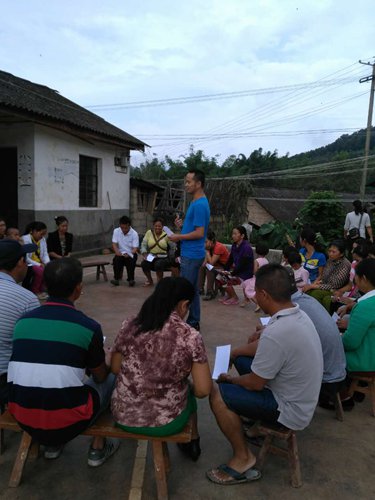
A Heifer China member of staff trains villagers in one of its poverty alleviation projects in Lancang county, Yunnan Province. (Photo/Courtesy of Heifer China)
Overseas NGOs benefit from anti-graft drive but have to adapt to a new law that keeps a watchful eye
Chen Taiyong, director of an NGO dedicated to eliminating poverty in China, is ill at ease.
Like many other people at such groups, he is watching closely for any new policies concerning the overseas NGO management law which is to take effect in around a month.
Registered with Department of Civil Affairs of Sichuan Province in 2008, Sichuan Haihui Poverty Alleviation Service Center is the representative of Heifer International in China. Heifer International, founded by an American in 1944, is a charity working to end hunger and poverty through providing agricultural supplies, education and business planning support.
The law on overseas NGOs adopted by the Standing Committee of the National People's Congress in April says that all overseas NGOs must register if they want to keep working in the Chinese mainland.
"The new law stipulates that we need to secure approval from a 'related authority' before registering at a public security organ. But it's still unclear which authority we should turn to for the approval," Chen, director of Haihui, told the Global Times.
"We welcome more standardized regulations. But as to whether the registration gets simplified or the opposite, we need wait and see," he said.
Lawmakers say the law is designed to standardize and supervise the activities of overseas NGOs, as well as preventing them from undermining China's State security.
"The extensive scrutiny is essential to regulate the activities of overseas NGOs, especially those prone to political advocacy," Li Xiaoyun, a professor at the China Agricultural University who has devoted himself to poverty relief for more than 20 years, told the Global Times.
"But I think those focusing on development undertakings such as poverty reduction can be treated differently so as to allow them to fully display their positive function."
Poverty relief is now high on China's agenda. Since reform and opening-up began in 1979, China has lifted more than 700 million of its citizens out of poverty. Overseas NGOs have been a major contributor to this, bringing funds, new ideas, experience and management models, Li said.
China has recently vowed to lift all its citizens out of poverty by 2020. By the end of last year, there were still 55.75 million people living under the poverty line.
"Foreign NGOs can be vital to the mission. Together with domestic NGOs, they can help local governments make full use of poverty-relief funds and sustain the effect," Li noted, adding that a lack of manpower and working skills are the main shortcomings of governments on the grass-roots level.
Similar worries
Liao Hongtao, director of the China program with Oxfam Hong Kong, a charity dedicated to fighting poverty and responding to emergencies which officially started working in the mainland in 1991, has similar concerns as Chen.
"The overseas NGOs' activities will be under dual supervision, with registration managed by public security organs and services by related government bodies. But the implementation rules are still not clear, we don't know whether it will go smoothly," Liao told the Global Times in a telephone interview.
Some local governments have already chosen to keep their distance. As poverty relief in China is government-dominated, NGOs usually have to cooperate with local governments or seek their permission before conducting activities.
There are about 7,000 overseas NGOs working in China, and fewer than 100 are specifically devoted to anti-poverty efforts, Li estimated. But Liao disagrees with this estimate. "Broadly speaking, disaster aid, education, health, hygiene and AIDS control can also be categorized as poverty alleviation. In this case, more than 80 percent of the NGOs based in Hong Kong are dedicated to the cause," Liao said.
Chen, who has worked with Heifer China for 31 years, found that some local governments started to reject their assistance in recent years.
"The main reason might be that the anti-poverty funds granted by central and local governments have become increasingly abundant," he said.
Official figures released in October showed that central and provincial funds allocated to anti-poverty this year surpassed 100 billion yuan ($14.5 billion) for the first time, nearly half the total amount invested from 2001 to 2010.
"There is also likely a link to our identity as a foreign NGO. Local governments have become vigilant towards us and cutting ties with us can keep them away from troubles once for all," he added, citing that their projects in the Tibet Autonomous Region which have been running smoothly since 1999 were all halted last year.
Villagers also prefer help from the government as it requires much less paperwork and subsequent reports, Chen said.
According to the model of Heifer China, once a village or community is chosen as an aid recipient, the NGO will help to set up support groups and select a coordinator. Classes will then be held to help build basic values, including mutual care, good faith and proactivity. After that, villagers are encouraged to make plans to boost their earnings. In the end, Heifer China will grant them funds and resources accordingly. The villagers also sign contracts with them to say how they will use the donations.
So far, Heifer China has helped 124,093 households in 152 counties in 17 provincial-level regions, and 90 percent of them have escaped poverty.


















































